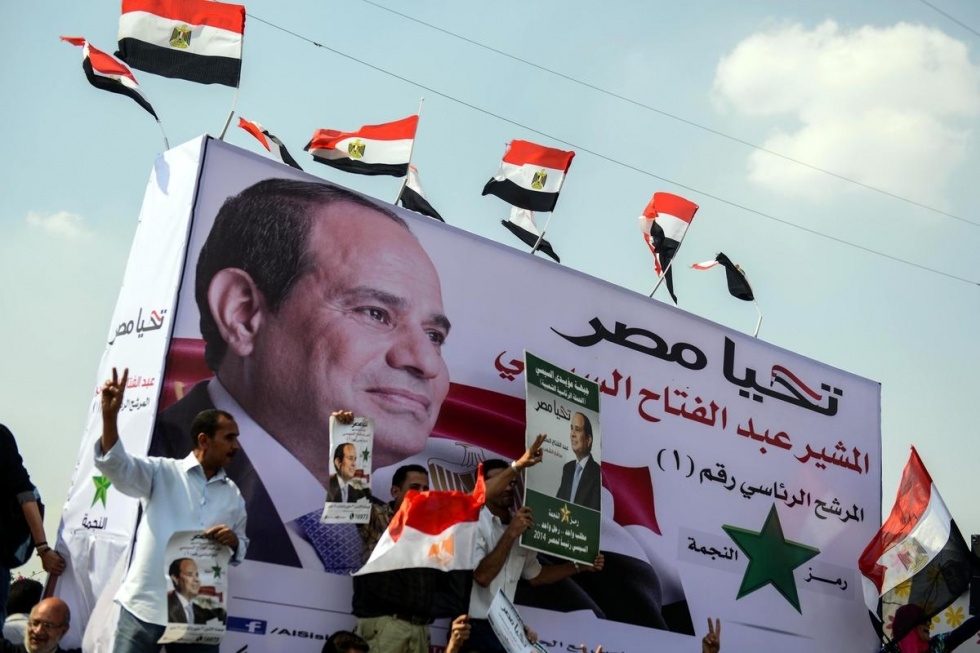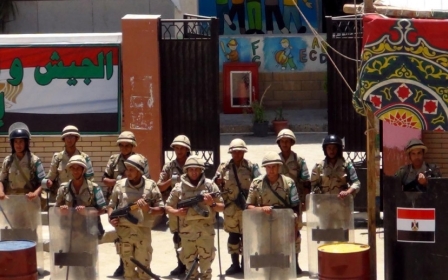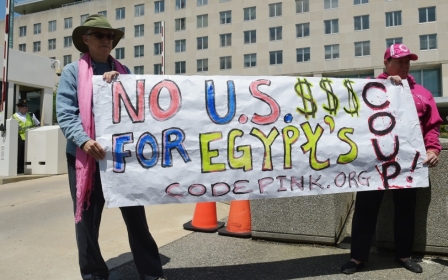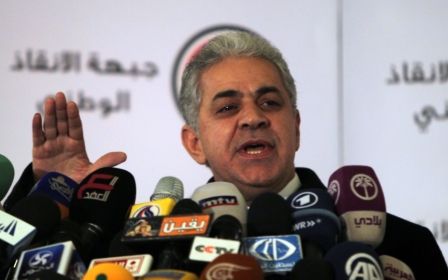Day 1: How the first day of Egypt's election unfolded

21.30
Final day of presidential vote a 'vacation'
The Egyptian government has declared the final day of the country's presidential vote a public holiday.
Speaking to the Egyptian television shortly after polls closed on the first day of the ballot on Monday, Prime Minister Ibrahim Mahlab said that the move aimed "to allow all Egyptians to cast their ballot".
21.00
New MEE newsletter: Jerusalem Dispatch
Sign up to get the latest insights and analysis on Israel-Palestine, alongside Turkey Unpacked and other MEE newsletters
Polling stations are readying to close across the country. However, those still in line will still be allowed to vote today. Voting restarts at 8am on Tuesday.
Two old friends vote for Sisi
Gamal Ahmed Abo Gael is a 60-year-old resident of the working class Cairo neighborhood, Sayeda Zeinab. He is a longtime member of the Nasserist Conference party. He came to vote in Abdeen, another Cairo neighborhood alongside Sohaira Hussein Bitwaldy, a friend.
“We want from Sisi to solve our problems in Egypt,” he Abo Gael said, “But we think, we are sure, he can solve our problems and make a new Egypt, new incomes and a new revolution for all egyptian life.”
Both candidates drew comparisons between themselves and Gamal Abdel Nassar during their campaigns. Nasser was a strong proponent of Arab nationalism, a sentiment that carries on into the campaigns of Sabahi and Sisi. “Our Army, our new government, they will solve the whole problem in our country, for example, General Al Sisi said no to America, to Obama, and said no to the countries who hate Egyptian people.”
With most of the country living in poverty, and few job prospects for the youth, the future of the economy looks grim, Abo Gael explained, “So it’s important for the new president to solve this problem”, he said, “If the new president can’t solve those problems, there will be another revolution.”
“I expect Sisi will be able to answer problem for young men and women, especially the one on the New Houses for the Youth, a program facilitating new families in Egypt with lower rents. I wait from Sisi to rebuild a new Egypt”, Bitwaldy said.

'We removed Mubarak to get Sisi', says Egyptian revolutionary
Maha, who declined to use her real name, is a young woman who was involved in the January 25th revolution. She is one of a large group of young people who have been disheartened with Egypt’s political trajectory since 2011.
“Today is Egypt’s election, an amazing charade played by the government, I don’t know who’s not involved”, she said, “Everybody knows who’s winning or who has already been elected by this amazing scenario played by everyone in the government starting from the 25th of January 2011.”
Since the summer of 2013, over 40,000 political prisoners were arrested according to Wiki Thawra, a human rights group collecting statistics on the Egyptian revolution, and over 1,000 Egyptians have been killed during protests. Many across the country support Sisi because of his crackdown on the Muslim Brotherhood and his guidance of Egypt’s “war on terror”.
Tension has risen between Sisi’s supporters and those critical of his actions. “Since we are not with them, and since we are not cheering, smiling and dancing and singing with all the Sisi stuff, people are against us”, she said, “now people said that we are against our country, Egypt”.
As Egypt moves towards another phase in this ongoing period of turmoil, many expressed a desire to move forward towards a more stable future. But, Mona says, “Nobody is searching. [Protestors killed during the summers’] families do not know anything about them, and nobody is talking about that. Everyone only talks about the MB, who killed like 10 policemen.”
Many see Sisi as a return to the policies of the Mubarak era. “Now are the results [of the revolution], we removed Mubarak to get Sisi”, Mona said.
 Maha – not her real name – said she took part in the January 25th revolution (Max Siegelbaum/MEE)
Maha – not her real name – said she took part in the January 25th revolution (Max Siegelbaum/MEE)Egypt's Sabbahi, the other presidential candidate
Footage of supporters of Egypt's presidential candidate Hamdeen Sabbahi
14:18
Tamarod party worker reported shot
Reports are emerging that a coordinator for the Tamarod party was shot dead earlier today in Kerdasa, a town in the Giza governorate that has been at flashpoint for violence over the past year and a stronghold for Morsi supporters.
Unverified reports on social media say that Mohamed Fathi, a Tamarod member who was working as a coordinator for the Sisi campaign, was shot in the town about 25 miles southwest of Cairo, early this morning.
Last year, Tamarrod, with alleged links to Egypt's military, collected millions of signatures for a petition calling for Morsi to be pushed out of office. The movement is now involved in the management of Sisi’s campaign. Also today in Kerdasa, security forces reportedly used teargas to disperse dozens of Morsi supporters who "attempted to prevent voters from casting their ballots," Al-Ahram Arabic news website is reporting.
Last August, a mob attacked a police station in Kerdasa and killed 13 officers, mutilating their corpses. The attack was reportedly revenge for the deaths of some 700 pro-Morsi protesters in Cairo that day. Numerous clashes were reported during Egypt's constiutional referendum that took place in January.
Sabahi team report electoral violations
The Hamdeen Sabahi camp say some campaign team members have been detained or barred from entering polling stations,according to Egyptian news site Ahram Online who cite a report by his campaign team.
Ahmed Hanafy, legal head of the Sabahi campaign in Giza, was detained and beaten by police at a polling station there. He is now being held at al-Warraq police station in Giza, according to the report.
An unsealed ballot box has been reportedly been seen in an Aswan polling station and several Sabahi campaigners have been denied entry to polling stations in Suez, Ismailiya, Qalioubiya and Minya.
Sectarian slurs mar presidential election
The Muslim Brotherhood has been accused of sectarianism after a photo was posted to its official Facebook page saying Christians will be responsible for the election of Sisi as president. The graph, posted to the social media site on Sunday and intended to encourage a boycott, says 48% of those voting are Coptic Christians. The Coptic community make up between 13 and 15 percent of Egypt's population.

Monitoring group: over 40,000 detained since military coup
Before today's election an Egyptian monitoring group released a report documenting the arrest and prosecution of 41,163 people since last July, with 89 percent held for charges relating to political participation and just 4 percent prosecuted for terrorism offences. Wikithawra, an independent statistical database, published the report on Sunday, one day before the presidential election.
Almost 10,000 people were arrested in the military offensive on 14 August in Cairo that targeted Muslim Brotherhood protest camps, which left more than 1,000 people dead. Two days later, during clashes between police and protesters, a further 2,652 were arrested and on the third anniversary of the revolution on 25 January 1,532 people were detained at demonstrations.
The Wikithawra report also documents the arrests of 166 journalists, 926 minors and 4,768 students since a military coup removed the country's first democratically elected president Mohammed Morsi from power in July last year.
Sisi Selfies?
As Sergi Cabeza and Alessandro Accorsi have reported for MEE, one major trend amongst Sisi supporters leading up to the elections has been custom-made campaign posters.
"Although these photoshopped pictures might appear slightly cheesy to an outsider, they are not considered tacky, but rather works of art, with graphic designers in working-class areas competing with each other to see who can blur more details together, using special effects and shiny glares," they wrote.
Posters run around $40 apiece, nearly as much as an average poor Egyptian makes in one month. To print four of them, a doctor working in a public hospital or a school teacher would have to spend his whole salary. Paying and commissioning them is regarded as a sign of wealth, importance and particular devotion.
There is apparently also a virtual equivalent.
 A custom-made campaign poster in Cairo (MEE/Alessandro Accorsi)
A custom-made campaign poster in Cairo (MEE/Alessandro Accorsi)How could the new election law affect results?
Earlier this year, Egypt's interim government passed a new election law that will regulate this week's election.
In a column for Middle East Eye, analyst Ryan J Suto outlines why he believes the law was passed to assure "state-desired results". Here's a snippet:
"The most troubling characteristic of the presidential election law is that all decisions of the PEC are only reviewable by the PEC itself. No decisions can be appealed to an external judicial or government entity. Especially interesting, under Article 228 of the 2014 Egyptian constitution, this will be the only election managed by the PEC; future presidential elections will be managed by the national election commission (NEC), which will be in charge of Egypt’s legislative elections later this summer. The decisions of the NEC are in fact appealable.
So why did the military-backed interim government create a body of named members of the maligned judiciary to have un-reviewable authority over only one election in which former Field Marshal Abdel Fattah el-Sisi has been heavily favored for some time? As the interim government could have easily allowed for appeals to the Supreme Constitutional Court, the answer can only be political in nature: the assurance of a state-desired result."
Who is boycotting?
Influential cleric Sheikh Youssef al-Qaradawi, based in Qatar, issued an email statement on Sunday urging Egyptians not to vote in the presidential election.
"People of Egypt in the capital and the provinces, cities and villages, sit in your houses and do not burden yourselves with a great sin," he said. "It is not permissible for you to vote for he who has disobeyed God," he added.
A number of political groupings and alliances have said they will boycott the election, from the anti-coup alliance to revolutionary groups as well as political parties.
The Anti-Coup Alliance, comprising Islamist parties, intellectuals and supporters, said it will not participate in "illegitimate elections", while Students Against the Coup, a university protest movement, have said they will continue to demand the reinstatement of ousted Mohamed Morsi as president.
The Revolutionary Front, formed last September and made up of several secular grassroots groups including the now bannedApril 6 movement, has said it will not take part in the election. They accuse both the military and the Muslim Brotherhood of undermining the revolution, although one member of the alliance, the Revolutionary Socialists, has endorsed Leftist candidate Hamdeen Sabbahi.
While most political parties have chosen to give their support to one of the two candidates, the Misr al-Qawia party is boycotting due to "the state of fear" it says has been caused by the military since last year's coup. The Egyptian Social Democratic Party has refused to take a stance and says it will remain neutral.
Voters share their support for Sisi on social media
Supporters of former army chief Sisi have been quick to take to social media and post photos of long lines of voters at polling stations. Free transport to the stations has been provided by the Salafist al-Nour party. The party has found itself in an increasingly precarious position in Egypt. Earlier this month, the party announced its support for Sisi. Just days later during a pre-recorded television interview, Sisi said he was not bound by any obligations to protect religiously-affiliated political parties. Since then, the Muslim Brotherhood has accused Nour of "betraying its Islamist roots".
Voters have been shown waving Egyptian flags and holding posters showing Sisi's face, demonstrating their support for the man widely expected to win the presidential election.
Hamdeen Sabbahi casts his vote
Presidential candidate Hamdeen Sabbahi has reportedly cast his vote in the Cairo neighborhood of Mohandiseen in the past hour.
While standing in line to vote, Sabbahi said he "strongly objected" to a draft law which will set new rules for parliamentary elections set for later on this year, and seen as the final step in a post-Morsi transitional roadmap.
"We need a parliament that fits the revolution...where at least 50 percent [of candidates run on] party lists and one that cultivates a democratic base," he told Ahram Online.
The leftist politician - whose profile you can read here - also hit out against priortising security concerns in the country over bread and butter issues.
"Egyptians' pain of poverty is no less than their pain of terrorism and [lack] of security," he said. "We don't want to give priority to security while leaving people hungry...we want to move forward in parallel."
Bomb reported in Mahalla; bomb denied in Mahalla
After Egyptian state television reported a small bomb blast outside of a polling station in Mahalla as voting began on Monday, Egyptian police deny that it was a bomb.
"It was an exhaust pipe backfiring," Brigadier General Ayman Helmy told AFP. Another security official said a "suspicious" object was found near the station, but it did not explode.
Police and army presence is reportedly high this election day moreso than past elections as the security situation in the country has worsened in recent months. Sisi hasn't appeared in a public rally during the election campaigns, only addressing supporters via Skype from a control room in Cairo. In a pre-recorded interview earlier this month, he alluded to two assassination attempts he had survived, but gave no further clarification as to whether these occurred before or after the 30 June 2013 ouster of former president Mohammed Morsi.
Polls open in Egypt
Polls opened across Egypt at 9am local time (7am GMT) on Monday for the country's presidential election in which former military chief Abdel Fattah el-Sisi will take on leftist politician Hamdeen Sabbahi. Over the next two days, an estimated 54 million eligible voters will have an opportunity to cast their votes for the first election since June 2012 when Mohammed Morsi was elected.
While Sisi is easily expected to win, one thing to watch for is voter turnout which could indicate the mood and direction of the country in months to come. With high voter turnout, Sisi will be able to claim that Egyptians are behind him, while a low voter turnout or a respectable Sabbahi showing would be a blow to Sisi and indicate that Egyptians are ready to challenge a third president, after pushing out two since 2011.
Middle East Eye will be following developments over the next two days here on the Live Blog and also use the election as an opportunity to dig a bit deeper into dynamics within the country right now. If you are in Egypt, we want to hear from you and see what you are seeing. Follow us @middleeasteye or email us or send your photos to [email protected].
Middle East Eye delivers independent and unrivalled coverage and analysis of the Middle East, North Africa and beyond. To learn more about republishing this content and the associated fees, please fill out this form. More about MEE can be found here.




